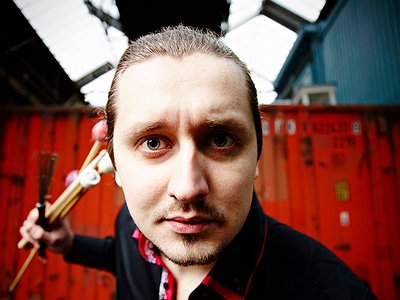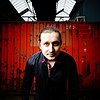Part 2
Could you describe your creative process on the basis of a piece or album that's particularly dear to you, please? Where did the ideas come from, how were they transformed in your mind, what did you start with and how do you refine these beginnings into the finished work of art?
It’s probably easiest to use my latest CD “The Collectors” as an example. I have always wanted to play on a huge set-up consisting of different types of percussion instruments - not only because it is challenging, but also because each of these instruments require a different approach to playing, and I find this really exiting.
“The Collectors” was commissioned in 2017, and consists of four works from four different composers with four different country backgrounds. All four composers have different musical and technical approaches. Although I asked them all to use the same basic set-up – marimba, vibraphone, and glockenspiel - each composer was allowed to choose any small percussion instruments to be hung on the rack or stand alone – drums, bells, gongs, Tam-Tams, and so on. So, my set-up for the second edition of The Dutch Golden Collection increased the number of instruments used enormously and has 51 components. I fell in love with the end result!
The way in which you grow to love such a daunting set up is the most exciting and inspiring part of playing percussion. It is important to feel inspired by your set-up and to know it like the back of your hand. The location of each instrument is a small but key part of the bigger world that the composer and performer are creating. For that, I love to spend hours and weeks playing different difficult passages over and over again, perfecting them, especially if there is a lot of space between the instruments.
What I learned after premiering 28 pieces written for me is that all pieces have a different character, approach and most importantly, a different concept. Once I know the concept of the piece really well and start to feel the set-up with my whole body, then I can start to think about musicality and perfecting the execution. It is important not to hesitate during your performance, thinking about which instrument is where and what I need to hit next. Playing percussion is a really physical task, so making the most of muscle memory can really help in this case.
There are many descriptions of the ideal state of mind for being creative. What is it like for you? What supports this ideal state of mind and what are distractions? Are there strategies to enter into this state more easily?
This is a really good topic to discuss and explore. I’m still trying to find the perfect “state of mind” by experimenting myself and talking to more experienced colleagues and artists about their thoughts.
I remember talking to one experienced composer about it, and he told me: “… inspiration is really important but deadlines quite often are the priority”. If you are a concert musician, deadlines can come in the form of tours and schedules, or composers with commissions.
That means that we shouldn’t wait for the inspiration to hit. We should just start working - preferably without long discussions about the “perfect state of mind”. Just do it! This is especially important if other people from the project are depending on you.
This is different for each individual, for different stages of life, and for different professions. I find it important to have a good sleeping pattern, healthy food, no alcohol or other mind-altering substances, plenty of time to think, and sport. We shouldn’t forget to factor in day-to-day tasks, because it is also a part of our job. We can’t be productive if we are tired or unhealthy.
How is playing live and writing music in the studio connected? What do you achieve and draw from each experience personally? How do you see the relationship between improvisation and composition in this regard?
Right now, I’m mainly busy commissioning new music and collaborating with composers, so thus far I haven’t had experience in composing as a part of my career.
I’m still discovering myself as a composer and will be happy to answer this question in few years’ time.
How do you see the relationship between the 'sound' aspects of music and the 'composition' aspects? How do you work with sound and timbre to meet certain production ideas and in which way can certain sounds already take on compositional qualities?
I think I’m quite a fortunate percussionist because I’m endorsed by professional instrument and mallet makers: Adams percussion, Zildjian cymbals and Mike Balter Mallets. These amazing brands are always open to support my ideas and help in my search for particular sounds and tone colours. This is vitally important for the creative process.
It quite often happens that a composer can hear a particular sound in his mind, communicates it to me, and from this I can try to produce it on instruments I own or know, but it is still not always sufficient as a final result. The above mentioned brands know exactly what we want and are always open to experiment, because only through challenges and experiments can we discover something brilliant, and open new doors to the magical world of sound.
Our sense of hearing shares intriguing connections to other senses. From your experience, what are some of the most inspiring overlaps between different senses - and what do they tell us about the way our senses work? What happens to sound at its outermost borders?
I have never consciously experienced art that combines all five senses. I think some of our senses are always overlapping: sight, hearing, and touch in particular. If we are listening to music and having dinner in a Michelin-star restaurant then we can definitely combine all five.
But in all seriousness, I once saw an installation in the Modern Art Museum, Vienna, which included all five senses except taste, and that was fascinating. Although taste and smell cannot easily be included in a piece of art or a performance, we always breathe – whether we are looking at Francis Bacon’s “Figure with Meat” or experiencing Ludwig van Beethoven’s "Ghost".
I mention Francis Bacon’s “Figure with Meat” in particular because when I look at this painting I can actually smell that meat. Sometimes presentations or premières are followed by receptions with drinks or appetizers, which give us a certain experience that will leave unconscious associations in our memory. The same applies to the smells in a concert hall, or museum.
Art can be a purpose in its own right, but it can also directly feed back into everyday life, take on a social and political role and lead to more engagement. Can you describe your approach to art and being an artist?
Although I’m not a political figure, I am interested in politics because I think we need to know what is happening around us. However, I do think that politics and art should be kept separate.
After experiencing art, we can become nobler, deeper by association and we can fulfil its message emotionally. I am really fascinated by the power of art: for example ‘Guernica’ by Pablo Picasso; the Socialist influence in Frida Kahlo’s and Diego Rivera’s works; or dictatorship in Shostakovich music.
I think it all depends on drawing inspiration from such pieces, and of course listening to your inner voice. I can’t speak for others, but mine has had enough at this point and I want others to hear and see my thoughts through my art. You can’t create history or a legacy without being political.
It is remarkable, in a way, that we have arrived in the 21st century with the basic concept of music still intact. Do you have a vision of music, an idea of what music could be beyond its current form?
I think music as art really depends on drawing inspiration from that which surrounds us. If we surround ourselves with the clean beauty of nature we will present to the listener a completely different point of view than if we are surrounded by the megapolis “monster” and are trying to survive there. Art depends on our life experiences and what we are ready to exchange in order to gain those experiences. Emotions and feelings are also involved, so as we can see the human condition is really important here.
I predict that, in the future, contemporary music will be more and more influenced by electronics but we will still need some acoustic elements as a base. In my opinion, the future will consist of anything and everything that has not yet been discovered. Therefore, percussion has a future yet to be discovered and I would like to face this future now.






